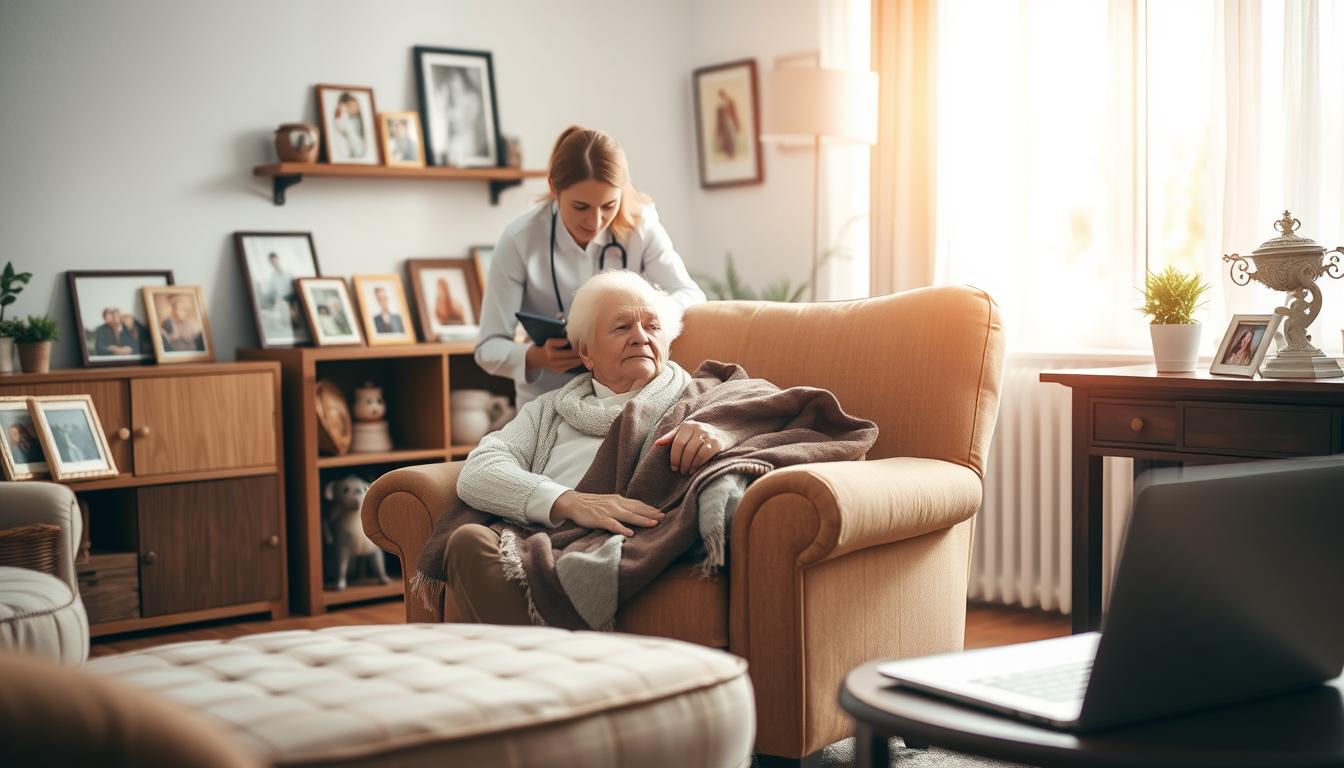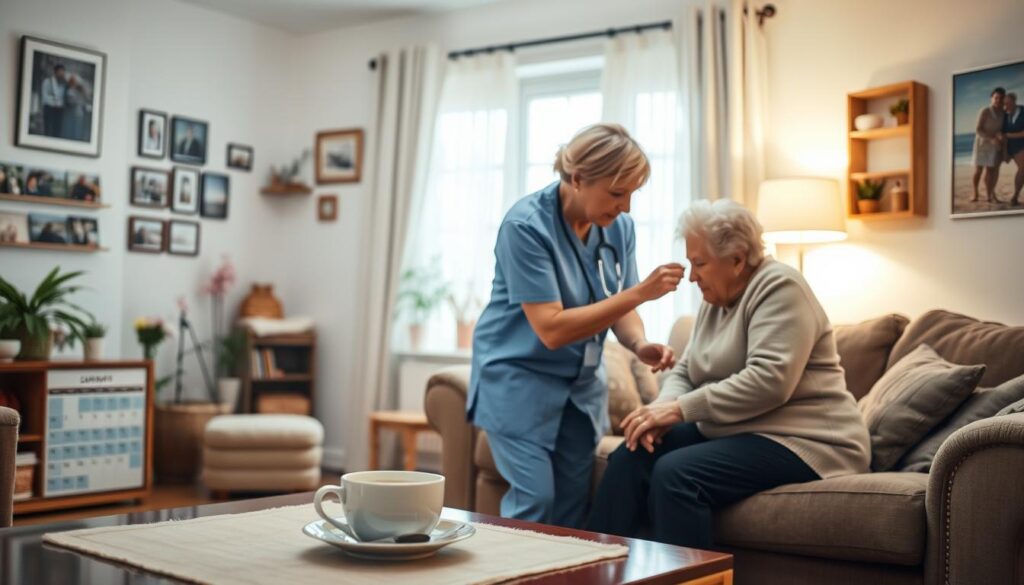Welcome to Dementia World elderly home services



Did you know that about 60% of family caregivers for adults over 50 also work full-time or part-time? This shows a big challenge many adult children face today. They struggle to balance their jobs with caring for elderly parents. This can lead to emotional and physical strain, affecting their health and well-being.
Many caregivers haven’t had a break from caring for a year. Others have to take jobs with less demand and lower pay because of their caregiving duties. It’s clear we need good strategies to balance work, family, and caring for elderly parents. Knowing how to manage time better can help reduce stress.
Caring for elderly parents is vital today, with about 34% of adults aged 45 and older doing so. They start with honour and commitment. Many seniors want to stay home, where they feel safest, making family support key.
Caregiving is not easy. Around 90% of family caregivers say it impacts their work life. About 60% of these caregivers work full-time, showing the challenge of balancing both roles.

The emotional toll can be huge; about 75% of caregivers feel stressed. Almost 40% show signs of depression, highlighting the need for help. Sharing duties with family can ease the burden, with 50% getting help from relatives.
Seniors with family support are 50% less likely to go to a nursing home. By 2060, 98 million elderly will need care, making family support even more critical.
Recognising caregivers’ importance boosts respect and support for them. It also highlights the practical needs they face, ensuring they get the help they need.
Becoming a caregiver for elderly parents means taking on many important tasks. You might manage health-related duties like booking doctor visits or giving out medicine. These tasks are key to keeping your loved ones healthy and happy, as part of senior care.
But caregiving is not just about health. It also includes helping with daily tasks like personal hygiene, getting around, and cooking meals. These activities are vital for keeping ageing parents’ quality of life high. With about 70% of caregivers helping with personal care, it’s clear why these duties are so important.
But caregiving is more than just physical help. It’s also about emotional support and being a friend. Talking regularly can help fight off loneliness, which many seniors face. Keeping the lines of communication open helps both the caregiver and the care receiver stay connected and informed.
Managing all these tasks can be challenging. Caregivers often have to balance caring duties with household chores. It’s important to set realistic goals and ask for help from family. Getting support can make a big difference in reducing stress and making caregiving easier.

Many people struggle to balance work and caring for elderly loved ones. This can lead to stressful situations. Caregivers must handle their job and the emotional and physical needs of their family members. About 34% of family caregivers find it hard to keep a full-time job because of caregiving.
Time management is a big issue. Caregivers often spend 20 hours a week on caregiving tasks. This makes it hard to meet work demands. Around 75% of family caregivers feel overwhelmed, which can harm their mental health.
Having flexible work hours is key for caregivers. Employers who support caregivers can help prevent burnout. Over 60% of caregivers of people with Alzheimer’s or other dementias manage to work while caring for their loved ones. Workplace support is often what makes this possible.
Transportation and managing medication are big challenges for caregivers. Getting to essential services can be hard, and financial worries are common. Caregivers spend about $7,000 a year on out-of-pocket care. It’s important to understand these challenges to support caregivers better.

Caring for elderly parents can be tough. It affects your time and how you feel. Using good caregiving strategies helps a lot. It makes things better for both you and your parents.
Here are some important tips. They help you set what’s most important and plan your day better.
It’s key to know what’s most important when caring for others. You also need to take care of yourself. Saying “no” when you can’t do more is okay. It helps you stay balanced and less stressed.
Knowing your limits is important. It helps you focus on what really needs your attention. This way, you can care for your parents better without getting too tired.
Good time management means having a schedule that fits your life. Make a plan for each day or week. This helps you fit in things like doctor’s visits and family time.
Having a plan keeps you organised. It makes sure you don’t forget important tasks like giving medicine. Talking to your family helps everyone help out. This way, caring for your parents becomes a team effort.

Finding the right elderly care resources is key for good caregiving. There are many ways to help care for elderly parents while keeping up with work and family. Knowing what support is out there can make a big difference for caregivers.
Many families use home care services for help. Over 75% of older adults want to stay at home. Home care agencies offer personal care, nursing, and companionship, costing between $20 to $100 an hour.
Medicare covers about 50% of home health service costs. But, there are rules and limits. Medicaid also helps, but it varies by state, giving families more options.
More employers now offer employee assistance programmes for caregivers. These programmes give counselling, legal advice, and help finding local resources. They also offer flexible work hours to help caregivers manage their duties.
Knowing about these programmes can boost caregiver support. It can also improve the wellbeing of those caring for elderly family members.

Caring for elderly parents can be very stressful. It’s important for caregivers to have emotional support. Community resources help by providing a place to share feelings and find support.
Caregiver groups are great for making connections. They offer support in person, by phone, or online. Sharing experiences and advice helps caregivers feel less alone.
Training programmes improve caregiving skills. They use proven methods to help caregivers manage their tasks. Respite services give caregivers a break, preventing burnout.
Emotional support is key to avoiding health problems. Caregivers often feel anxious and depressed. Counselling helps improve mental health, balancing care for others and oneself.
Emotional support is vital for caregivers’ well-being. Community resources and groups help them cope. These networks reduce isolation and give caregivers the strength to carry on.
| Support Type | Description | Benefits |
|---|---|---|
| Support Groups | Regular meetings for sharing experiences and advice. | Reduced feelings of isolation, emotional resilience. |
| Training Programmes | Evidence-based practices tailored to caregiving needs. | Enhanced skills and confidence in caregiving. |
| Respite Services | Temporary breaks from caregiving responsibilities. | Reduced stress levels, increased self-care opportunities. |
| Counselling Services | Professional support for managing emotional and mental health. | Improved mental health, coping strategies. |
Caring for elderly parents is rewarding but also demanding. It’s key to prevent caregiver burnout. Spotting burnout signs early helps keep caregivers well and care quality high. Signs include sleep issues, irritability, and hopelessness, seen daily.
Each caregiver may show burnout differently. Yet, common signs include:
About 39% of U.S. adults care for a loved one. Spotting these signs early helps in using self-care strategies. This can prevent burnout.
Self-care is key for effective caregiving and stress reduction. Self-care strategies include:
Self-care benefits extend beyond individual health. It improves caregiver well-being and care quality. Caregivers should not ignore their health due to guilt. Sharing responsibilities can lead to a more balanced caregiving approach.
| Self-Care Strategies | Benefits |
|---|---|
| Regular breaks or respite care | Reduces stress and enhances energy levels |
| Support groups | Provides emotional support and helpful resources |
| Engaging in hobbies | Boosts mood and reduces feelings of isolation |
| Physical activity | Improves physical health and reduces anxiety |
Caring for elderly parents is a big job that needs careful thought. It’s important for the well-being of both the caregiver and their loved ones. In the U.S., about 34% of adults are caregivers, facing a lot of stress.
It’s key to find ways to balance work, family, and caregiving duties. This can be tough, but it’s doable with the right strategies.
Recognising the challenges of elderly care is the first step. Caregivers should use all the resources they can find. They should also look for emotional support and take care of themselves.
Even though only 30% of caregivers take breaks, support groups can help a lot. They can make caregivers feel up to 29% better. This shows how important it is to connect with others.
In the end, caring for elderly parents is a big challenge. But with good organisation, looking after your health, and socialising, you can make a difference. Taking care of yourself as a caregiver makes a big difference for both you and your parents.